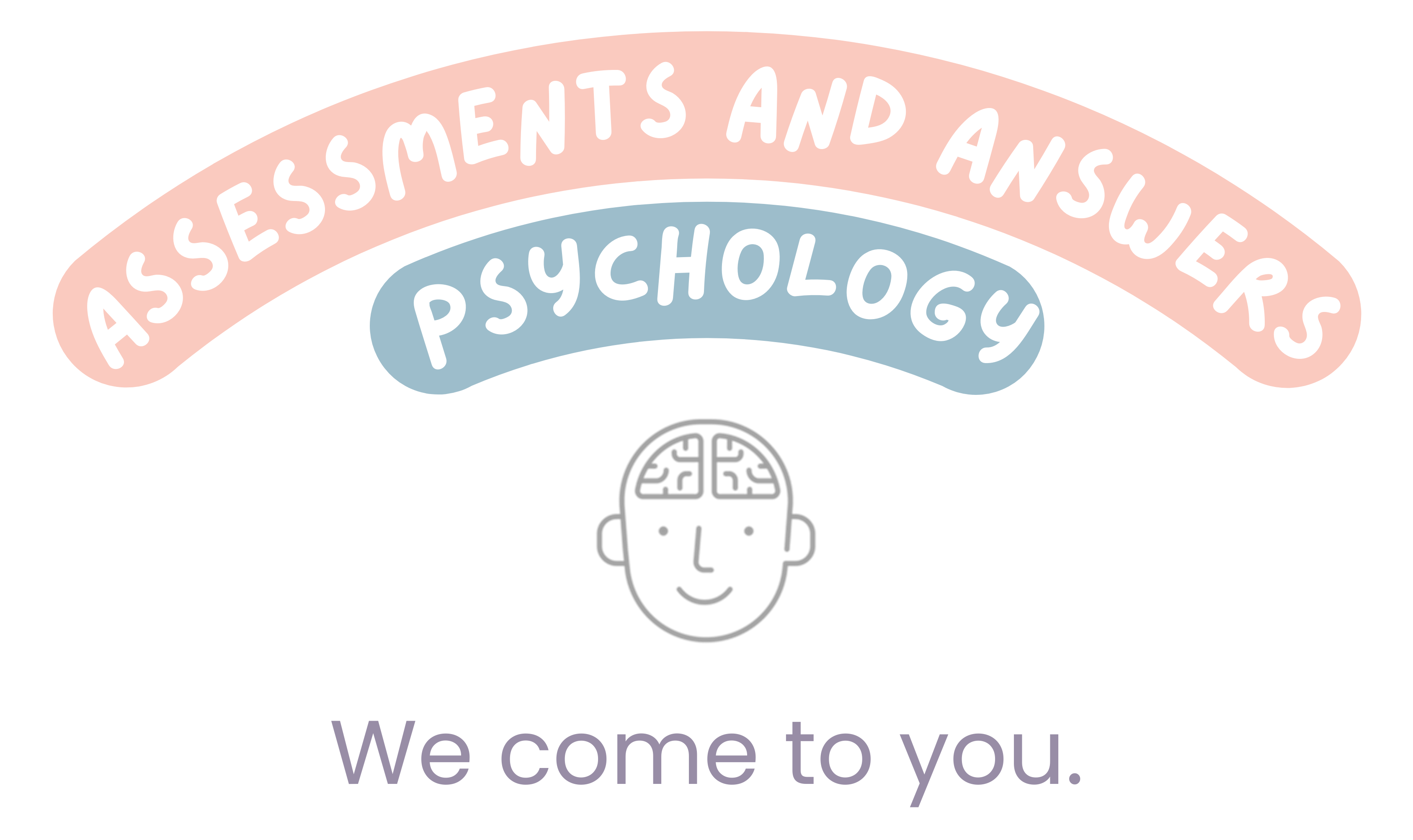Mobile Education & Learning Assessments for Children
A Busy Parent's Solution
Learning impairments in children can manifest in various forms, such as difficulties with reading, writing, math, or problem-solving. These challenges may be due to intellectual disabilities, specific learning disabilities, or even exceptional abilities requiring specialized support. Education and learning assessments help identify intellectual disabilities, specific learning disabilities, or giftedness, and are crucial for determining placement in specialized programs. Additionally, they provide a solid foundation for clinical interventions, offering insights that support your child’s unique educational and developmental needs.
Understanding Education and Learning Assessments

“How do I know if my child needs education and learning assessments?”
Learning impairments can affect different aspects of a child’s development, from academic performance to social skills. Here are some common signs that may suggest the need for further evaluation:
- Cognitive and Problem-Solving Challenges
- Difficulty understanding concepts (e.g., time, cause and effect, basic reasoning).
- Struggles with memory, such as forgetting instructions or having difficulty retaining new information.
- Slow processing speed—taking longer than peers to complete tasks.
- Difficulty with organisation and planning (e.g., keeping track of belongings, structuring thoughts).
- Speech and Language Delays
- Limited vocabulary or difficulty forming sentences compared to peers.
- Trouble understanding questions or following multi-step instructions.
- Struggles to express thoughts clearly or recall specific words.
- Learning and Academic Difficulties
- Difficulty recognizing letters, numbers, or basic words (potential signs of dyslexia or dyscalculia).
- Struggles with reading comprehension and writing.
- Poor handwriting and spelling, or trouble learning new words.
- Difficulty grasping basic math concepts or identifying patterns.
“Why does my child need education and learning assessments?”
Children may experience challenges in their learning abilities, which can lead to frustration, a lack of confidence, and low academic achievement. In contrast, some children may demonstrate exceptional learning abilities, placing them ahead of their peers academically, but still lack the necessary educational support to thrive.
Cognitive and intellectual assessments are designed to identify both strengths and areas for improvement in a child’s learning journey. These assessments evaluate cognitive abilities, academic skills, and social-emotional functioning through standardised measures, providing a comprehensive understanding that includes a full-scale IQ score and age-equivalent rankings.
The results of these assessments offer valuable insights into your child’s unique learning profile. They guide educational planning and inform tailored interventions and accommodations to meet individual learning needs. This information is essential for developing an effective, personalized education plan that ensures your child receives the support necessary to reach their full academic potential.
Getting Started: The Intake Process
Intake Session
- A 30-60 minute intake session is available for families uncertain about the most suitable assessment process.
- During this session, the psychologist will work with the parent/guardian to explore your child’s developmental history, relevant family background, and presenting challenges. Rating scales may also be completed to determine the most appropriate assessment and to schedule future appointments.
Inclusions and Timeline
- The Conner’s Comprehensive Behaviour Assessment (CCBA) will be provided to the child’s teacher and parent for completion through an online questionnaire.
- Once completed, the psychologist will evaluate the CCBA results to determine the most suitable assessment for the child.
- A follow-up appointment with the parent or caregiver will be conducted via phone or video call to discuss the CCBA findings, complete additional rating scales, and outline the next steps in the assessment process.
Comprehensive Assessments Process
No referral from a general practitioner is required for this assessment. The process involves several components, including:
1. Clinical Interview and History Gathering
The psychologist will start with a clinical interview, speaking with the parent or caregiver to gather important information about the child’s family and medical history, developmental milestones, and academic performance.
2. Rating Scales
The psychologist will ask the child (depending on their age), the parent or caregiver, and the child’s teacher (if applicable) to complete questionnaires. These rating scales help assess characteristics related to learning impairments and overall functioning.
3. Standardised Assessment
The psychologist will use standardised cognitive and academic assessment tools to evaluate the child’s current learning abilities.
4. Developmental and Cognitive Testing
This step involves assessing the child’s cognitive abilities, language skills, academic functioning, adaptive functioning, and executive functioning skills using recognised assessment tools. This provides valuable insights into their current cognitive and academic performance.
5. Report and Recommendations
As part of the assessment, you will receive a comprehensive report along with recommendations. Please note that reports typically have a turnaround time of 4–6 weeks. The findings will be discussed with parents or caregivers during the feedback session.
"What’s included as part of the assessment?”
Inclusions and Timeline
Our education and learning assessment process consists of a series of sessions designed to explore your child’s cognitive, academic, and developmental strengths, as well as areas for growth. These sessions provide valuable insights and practical recommendations to support your child’s unique learning needs.
Session 1: Cognitive Assessment (WISC-V) – up to 2 hours
In this session, our psychologist will use the Wechsler Intelligence Scale for Children, Fifth Edition (WISC-V), to assess your child’s cognitive abilities, including reasoning, language skills, adaptive functioning, and executive functioning. This comprehensive evaluation offers insights into your child’s current learning capacity and social skills, guiding the development of personalized interventions and informing diagnoses when necessary.
Session 2: Academic Achievement Test (WIAT-III) – up to 3 hours
Our psychologist will administer the Wechsler Individual Achievement Test, Third Edition (WIAT-III), to evaluate your child’s skills in listening, speaking, reading, writing, and math. The results will help identify specific areas of strength and difficulty, allowing us to create targeted strategies to enhance your child’s academic success.
Session 3: Feedback and Recommendations – up to 1 hour
The feedback session will be scheduled 4-6 weeks after the final assessment. Parents or caregivers will receive a detailed report outlining the assessment findings and tailored recommendations. This session can be held in person, by phone, or via video call, where our psychologist will discuss effective ways to support your child’s learning and development based on the results.
Fee Schedule and Duration
Our assessment fees are based on clinical time, charged at an hourly rate of $250.00. The total clinical time may vary depending on individual client needs, which we will discuss with families during the intake process. Additionally, a fee of $120 for assessment materials is included in all cost estimates.
Mobile ADHD Assessment Fee Estimate: $2,620
(Based on 10 hours of clinical time and assessment materials)
Important Notes:
- Deposit: A non-refundable deposit of $500.00 is required at the time of booking.
- Final Invoice: An invoice will be issued following the completion of each assessment component.
- Payment: Full payment must be received prior to the feedback session.
- Medicare Coverage: Assessments are not covered by Medicare.
- Private Health Insurance: Some psychological services may qualify for rebates. Contact your insurer to confirm eligibility.
- NDIS Funding: Diagnostic assessments are not funded by the NDIS unless specifically requested by the National Disability Insurance Agency (NDIA). Cognitive assessments may be covered under certain circumstances; please consult your local area coordinator for details.
- Medicare Rebates for Referrals:
- When referred by a paediatrician or psychiatrist, up to four hours of diagnostic assessment may be eligible for a rebate of $93.35 per hour.
- This rebate applies only to standardised assessments and developmental/cognitive testing.

